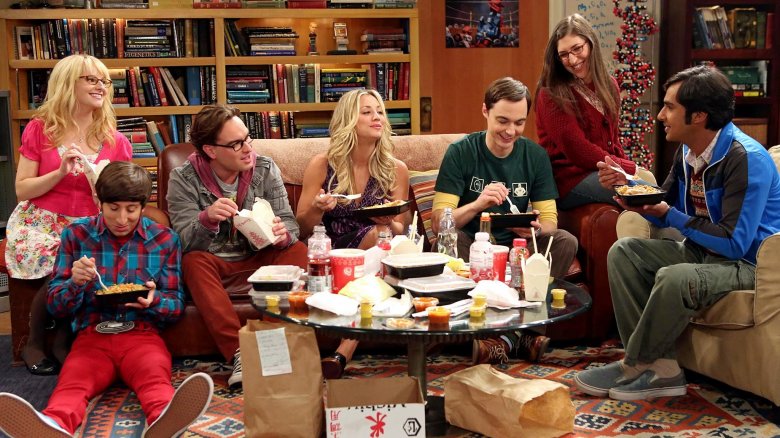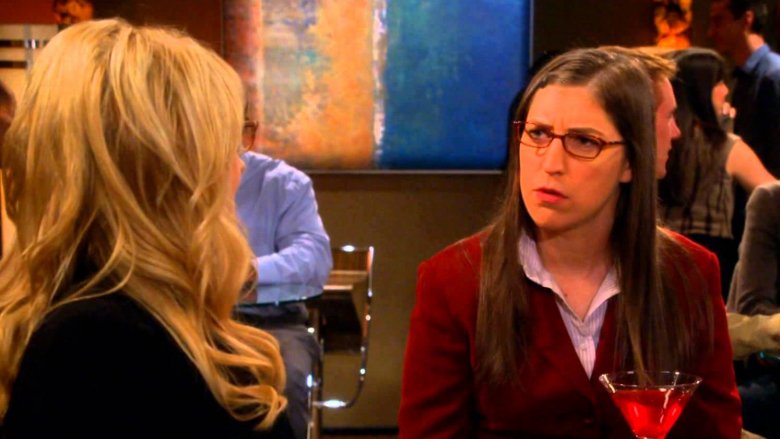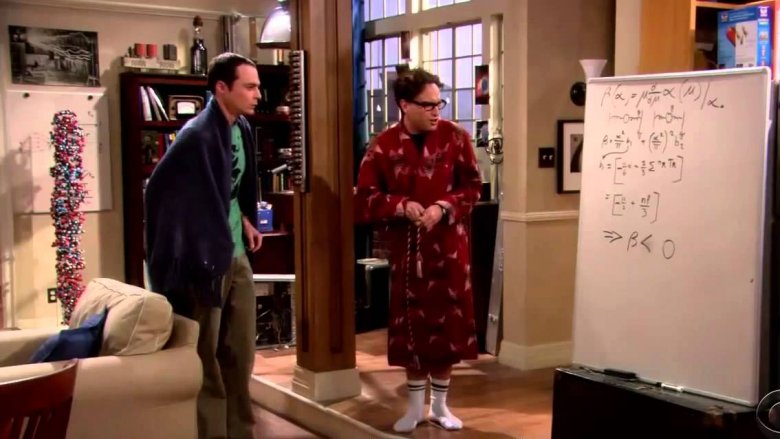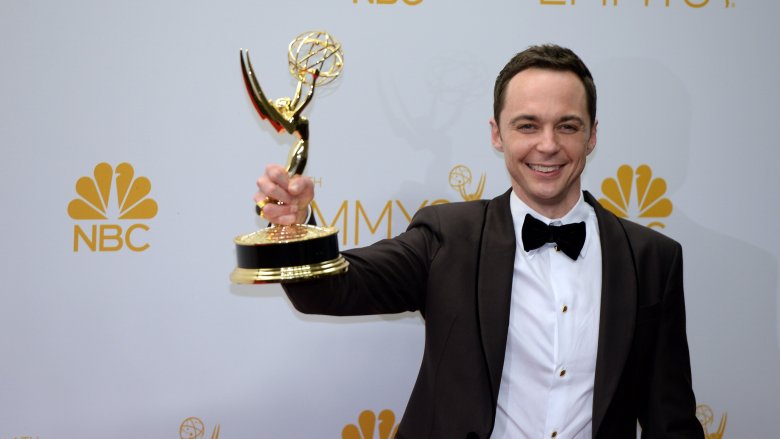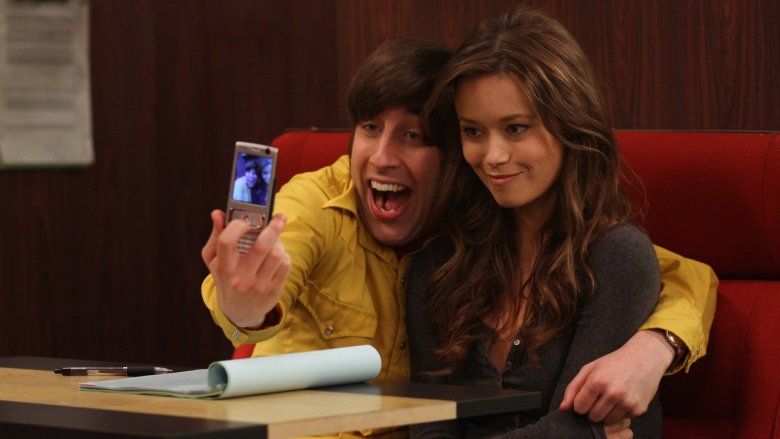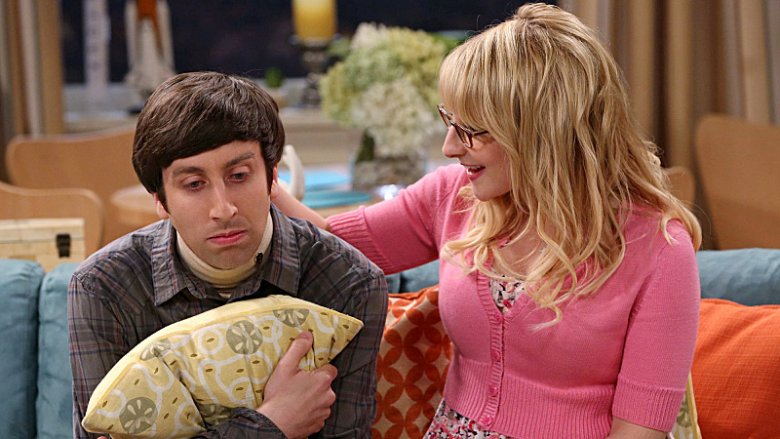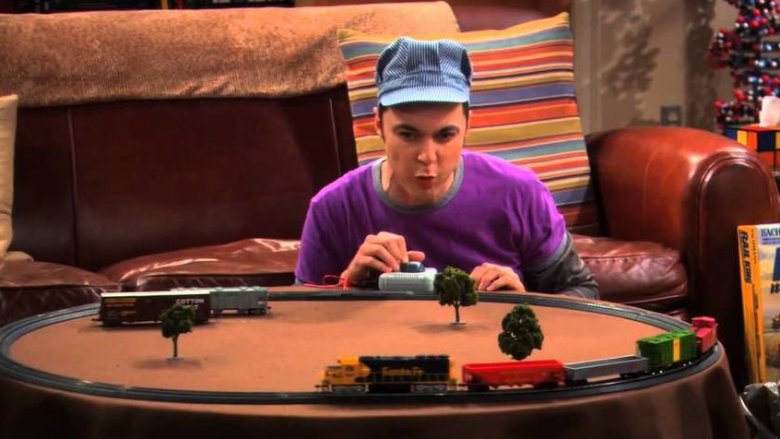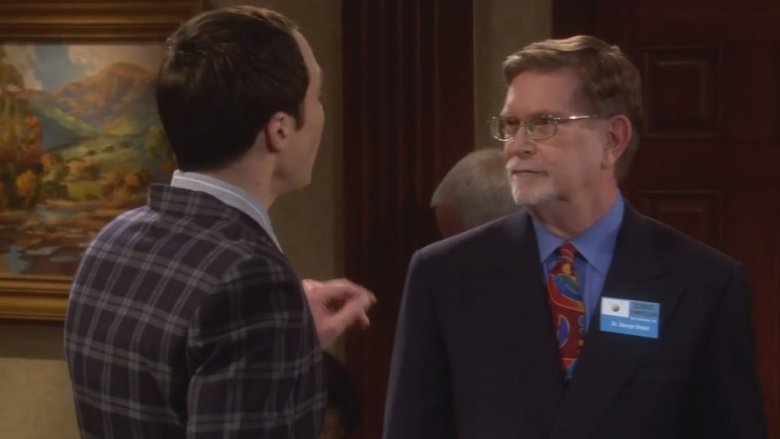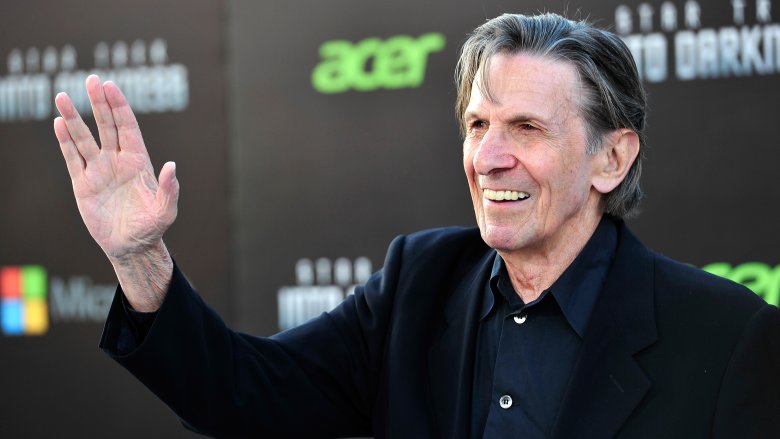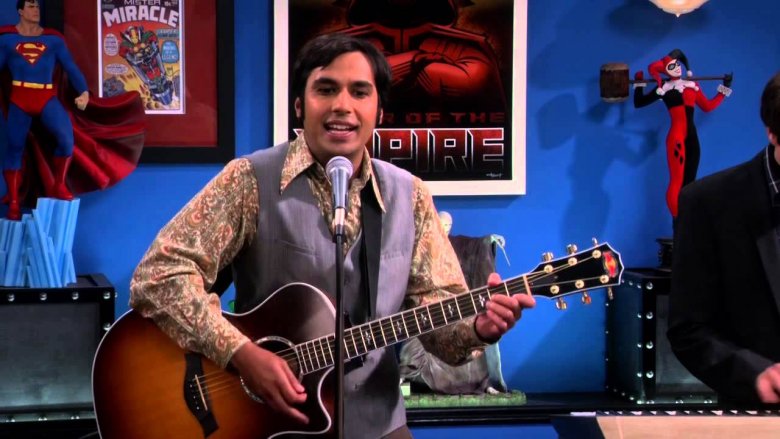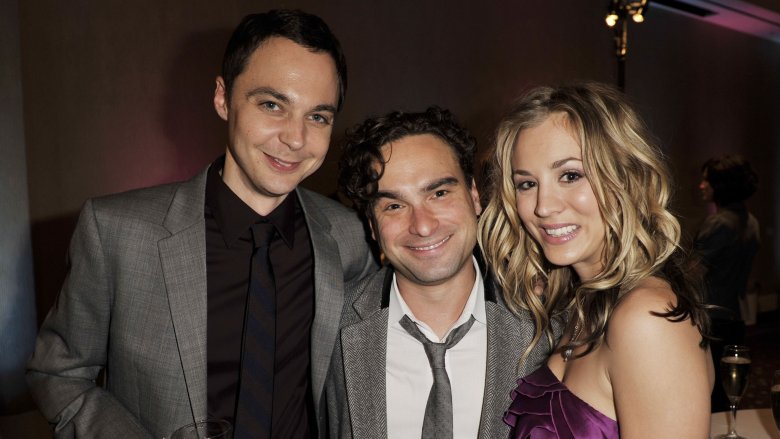The Real Reason Big Bang Theory Is So Successful
There is literally no other show on TV as watched as the Big Bang Theory. In 2016, Big Bang beat every single other TV show in U.S. ratings, with nearly 20 million viewers tuning in to watch the antics of Sheldon and Co., more than watched Sunday Night Football. (And Americans love Sunday night football.) The CBS sitcom is a juggernaut. The modern world's answer to Friends or M*A*S*H. As often happens with any show that reaches such popularity, it's also the internet's favorite punching bag.
You've probably seen the articles. Big Bang is only popular because it's utterly bland. It's blackface for geeks. Jim Parsons only stays young by bathing in the blood of virgins. You know, normal, standard backlash stuff. But there's another argument, too. One that suggests Big Bang is popular not just because it's funny or because viewers are dumb, but because it's way smarter, edgier, and more groundbreaking than anyone gives it credit for. You won't find this stuff in many other multi-camera sitcoms.
It features successful female scientists like it's no big deal
Here's a quick game. Name the last sitcom you saw that featured two successful female scientists who aren't A) background characters, or B) using those science-smarts to cut up dead bodies. Now try and name the last TV show you saw where those two characters not only exist, but have entire episodes devoted to them. Scouring your memory banks for award-winning Netflix dramas? You don't have to bother. Big Bang has been hitting that sweet spot since the days when "female scientist" was still code for "this movie has Megan Fox wearing a labcoat in it."
Played by Melissa Rauch and Mayim Bialik, microbiologist Dr. Bernadette Rostenkowski-Wolowitz and neurobiologist Dr. Amy Farrah Fowler joined the cast in Season 3, way, way back in the halcyon days of 2009. As NPR notes, while they were originally introduced as romantic foils for Simon Helberg's Howard and Jim Parsons' Sheldon, they've since grown into their own characters, becoming cast regulars and getting their own storylines about both their lives, and what it's like to be professional, accomplished women in a traditionally male-dominated world. For a show that started about four nerds lusting over the hot waitress next door, that's some pretty impressive visibility.
In Bialik's case, it's even translated into real-world impact. As reported by Forbes, Bialik is herself a qualified neuroscientist, and she now leverages her Big Bang fame into visiting schools and trying to get teenage girls interested in STEM subjects.
It uses real, actual science
Television shows that are nominally about science have a patchy record of actually including any science. Just see Wired's takedown of the nonsense jargon in CSI: Cyber. That's the exact sort of world you'd expect Big Bang to inhabit. Sure, it's a sitcom about scientists, but it's mostly aimed at regular people who aren't entirely sure if protons are real or just something invented for Ghostbusters. So it can come as a surprise to learn that Big Bang features real science and then uses that science to make background jokes in a way no show has done this side of Futurama.
Since its inception, the show has retained UCLA professor David Saltzberg as its go-to guy for science stuff. Those uber-complex equations you see scrawled on the whiteboards in the boys' apartment most episodes? Those are all real, and are often selected by Saltzberg to act as in-jokes either about contemporary science debates or what's going to happen in the episode. NPR has revealed that Saltzberg sometimes even gets half-finished scripts with "Insert science here" written in the dialogue brackets.
Big Bang even has a proper scientist among its main cast. Mayim Bialik, who plays Dr. Amy Fowler, is a trained neuroscientist who helps the crew with stuff like selecting the right props (the example she gave NPR was the kind of microscope the characters should be using). It's not quite as wonderfully science-focused as a real-life Sheldon might wish for, but then what is?
Jim Parsons is a genuinely accomplished actor
The core of Big Bang is Jim Parson's performance as loveable/hateable man-child Sheldon Cooper. Even if you've never seen a single second of the show, you probably recognize his catchphrase, "Bazinga!" Played as a kind of socially inept Pee Wee Herman (only thankfully without the conviction for child pornography), Sheldon is both the most revered and reviled character on the show. Type "Sheldon Cooper annoying" into Google, and you'll get almost as many hits as you do for "Harry Potter slash fic."
Personal preference is one thing. It's absolutely cool that some people find Sheldon more off-putting than a dungeon sex party thrown by Willy Wonka. But the flak Parsons gets alongside his creation is unfair. Parsons is a bona fide thespian.
Over the years, Parsons has picked up more awards for Big Bang than most actors manage in an entire career. Beyond that, he's taken to stage in a big way, earning rave reviews on Broadway. Here's the New York Times fawning over his starring role in a 2012 production of Harvey. Here's Vulture praising him for his 2015 run in Act of God. His work on the Broadway version of the Normal Heart was so good that he wound up in the HBO version of it.
While we're discussing Parsons, isn't it also kinda cool that the highest-paid actor on American TV is openly LGBT? That would've been unthinkable even within Big Bang's own lifetime.
The characters grow and evolve (even Sheldon)
Big Bang is a multi-camera sitcom and, like all multi-cam sitcoms, prides itself on being a show you can dip in and out of at any point in its run. It's only when you look back at the show's beginnings that you realize how misplaced this pride is. For a broad sitcom, Big Bang's characters change and evolve more like they're in a serial drama. (Uhhh ... okay, except Raj.)
Howard is the best example. When we first met him, Simon Helberg was playing the character like a horny cross between Family Guy's Quagmire and a slimy teenager whose bed sheets you really don't wanna have to change. Flash forward to later seasons and we've watched Howard shake off his creepy side, settle down with Bernadette, overcome his fears to go into space, and learn to cope after the — surprisingly emotional — passing of his mother. In short, he's done what we all do. He's grown up. Just like Penny, who went from the Smurfette to a career woman who movingly put her dreams of acting stardom behind her.
For drama, this ain't unusual. But for a show like Big Bang? It's like reading Garfield one morning to discover the fat cat has given up lasagna, moved out of Jon's apartment, and is saving whales with Greenpeace. We've even seen Sheldon mature and learn to become emotionally open, leading The Atlantic's TV critic to call him "one of the most compelling characters on TV."
It touches on some truly heavy stuff
From its reputation as a broad piece of slapstick, you wouldn't realize Big Bang had tackled some surprisingly heavy stuff. The show occasionally goes to emotional places that other mainstream sitcoms simply wouldn't.
One of those places involves Bernadette's feelings about pregnancy. As early as Season 5's "The Shiny Trinket Maneuver," Melissa Rauch's character is talking about the ways pregnancy can screw up a woman's career and leave her isolated. By Season 10's "The Dependence Transcendence," Bernadette is pregnant and able to talk about how she feels no love or excitement for her unborn baby. As Glamour's reviewer pointed out, that's not just heavy for a network sitcom, it's something few people are willing to talk about in real life.
Sitcoms are meant to sacrifice everything for laughs. The Fresh Prince killed off a recurring character as a throwaway gag. Seinfeld had Susan die and played it for laughs. When Mrs. Wolowitz dies on Big Bang, the writers have Sheldon say the following, heartfelt words to Howard: "When I lost my own father, I didn't have any friends to help me through it. You do." The AV Club called the moment "beautiful."
It's not unheard of for sitcoms to tread these paths. M*A*S*H treated the horrors of war seriously, and 8 Simple Rules featured one of the most painful character deaths ever put to screen. Big Bang may not touch these heights, but it is deeper than people give it credit for.
It has inadvertently helped spread autism awareness
Is Sheldon Cooper autistic? The canon answer is no. The off-the-record answer? Jim Parsons has told NPR that Sheldon has a "a lot of the traits" of autism-related Asperger syndrome, and a whole bunch of viewers clearly believe he's autistic. While some have taken offense to the idea, others have embraced it. Go looking on autism blogs, and it's clear that Sheldon has been a huge inspiration for some.
The charity Autism Speaks has a guest blog from a staffer titled "Why Our Autism Community Loves Sheldon Cooper." One of the key points it makes is that it almost doesn't matter whether Sheldon has autism or not. Because the perception is there, "the show's popularity has brought this discussion (on autism) to a large national audience."
It comes down to visibility. Just as Sesame Street brought us the Julia, who has autism, to take the stigma away among children, so Sheldon can give older kids with autism someone on TV to relate to. The Adventures in Aspergers blog directly credits Big Bang with spreading autism awareness.
Speaking with Neil deGrasse Tyson, Mayim Bialik summed up the show's attitude toward any possible disorders the characters might have (via Radio Times): "What we're trying to show ... is that this is a group of people who likely were teased, mocked, told that they will never be appreciated or loved, and we have a group of people who have successful careers, active social lives. ... They also have relationships, and that's a fulfilling and satisfying life."
The cultural references can be truly obscure
Just as Big Bang goes the extra mile to get its science right, so it does with geeky cultural references. While any episode might contain the guys talking about Thor or Terminator or something else in the geek mainstream, it probably also contains references to stuff that's so obscure it'd have the Mystery Science Theater 3000 guys reaching for their iPhones.
To take one example, the Season 5 episode "The Friendship Contraction" drops a reference to obscure British sci-fi comedy Red Dwarf, including giving the correct number of total episodes (although they goof over how many were available on DVD at that time). To take another, Leonard briefly wears a Seal of Rassilon T-shirt in one episode, a classic Doctor Who reference so obscure there are probably actors who have played the Doctor himself who wouldn't get it. There are references to beloved but lesser-known comic series like Saga, and so many quotes and nods to Star Trek it's impossible to know where to start or end.
The show has gone even further with its guest stars, featuring scientists the casual viewer would have no chance of knowing. People like real-life astronaut Mike Massimino, or string theorist Brian Greene. For every cheeky cameo by a recognizable guy like Elon Musk or Neil deGrasse Tyson, there's one by someone like Nobel Prize winner George Smoot (pictured). As Digital Spy has noted, this going above and beyond the call of geeky duty has doubtless won the show fans.
It really cares about its inspirations and guest stars
If Chuck Lorre had wanted to, he could have written Big Bang with made-up jargon and easy "geek" references to Marvel — 90 percent of viewers wouldn't have noticed the difference. That little extra attention to detail is one of the reasons Big Bang is better than its reputation suggests, and it's reflected in the respect the show has for its real-life geek inspirations. Big Bang, for example, doesn't just namedrop Leonard Nimoy. It acknowledges his place in the geek canon in a way that's beautiful and heartbreaking all at once.
The acknowledgement came in the wake of Nimoy's tragic death in February 2015. That week's Big Bang episode aired as normal. But, when the end rolled round, the usual scrawled musings producer Chuck Lorre puts on "vanity cards" at the end of every show were gone. In their place was a simple, black and white picture of the late Star Trek star, and the touching caption: "The impact you had on our show and on our lives is everlasting."
For a show to do that in honor of an actor who didn't actually work on it (apart from one brief voiceover in Season 5) is strangely beautiful. And Big Bang has similar form with its recurring guest stars. After Carol Ann Susi, who played Mrs. Wolowitz, passed away in 2014, the show honored her both with a similar, touching end credits message, and a truly emotional storyline about the death of her character.
It's one of the last, big multi-cam sitcoms left
Multi-cam sitcoms (usually filmed with a live studio audience) are dying. The format that brought us Friends, Cheers, Frasier, Seinfeld, Everybody Loves Raymond, Roseanne, and countless others has had its day. In 2017, ABC was without a single multi-cam show for the first time in years (via Hollywood Reporter). Even CBS, which shows Big Bang, is abandoning the format. The trend these days is for single-cam, no-laugh track sitcoms (filmed more like feature films, without live audiences) like 30 Rock, Louie, and Parks and Recreation. Even Big Bang prequel Young Sheldon is ditching the multi-cam format.
The trouble is, people like multi-cam sitcoms. They're comforting. Familiar. Louie may smash boundaries and show us things we've never seen on TV before, but it's not what you want to watch when you're hungover on a Saturday afternoon and you still haven't changed out of last night's underwear. As critic Jaime Weinman noted for Vulture, "There's a high demand for multi-camera — it's intimate and creates the illusion that there's nothing between you and the characters — and right now the supply is low. Fans of Seinfeld and Friends, what do they have besides Big Bang?"
True, there are multi-cam sitcoms other than Big Bang out there, but they're smaller and, as happened in August 2017 to the critically acclaimed The Carmichael Show, prone to abrupt cancellation. Big Bang is only gonna end if it stops making CBS money or if producer Chuck Lorre has a breakdown and vanishes off to Cambodia to become a New Age guru.
The core cast is really tight
We viewers like the people playing our favorite characters to resemble them in real life. Imagine finding secret footage of Chris Pratt punching a dolphin. You'd be chucking Guardians of the Galaxy DVDs out the window faster than you can say "Wait, why do I still have DVDs like it's 2009? This metaphor sucks."
Big Bang is no different. After seeing the cast hanging out on screen, hearing that they really hated each other's guts would be upsetting. Happily, that's not the case, and it brings us to yet another reason why so many people respond to the show. The core cast members are all tight in real life.
This is maybe surprising. Johnny Galecki and Kaley Cuoco actually dated during the early seasons of the show's run, before splitting up and then having to continue playing a married couple onscreen. That could have been poison for the show's chemistry but, as E! details, the two wound up instead like Elaine and Jerry from Seinfeld: as total BFFs. Cuoco and Parsons, too, have a kind of intense, bi-gendered bromance (brogirlmance?) going on, spending a ton of time hanging out offset.
In fact, being real-life friends seems to be a recurring theme with the actors on Big Bang. People has an article about how Melissa Rauch and Simon Helberg, and Jim Parsons and his husband all spend time together. That honest warmth coming across on screen? That's why people still love The Big Bang Theory.
